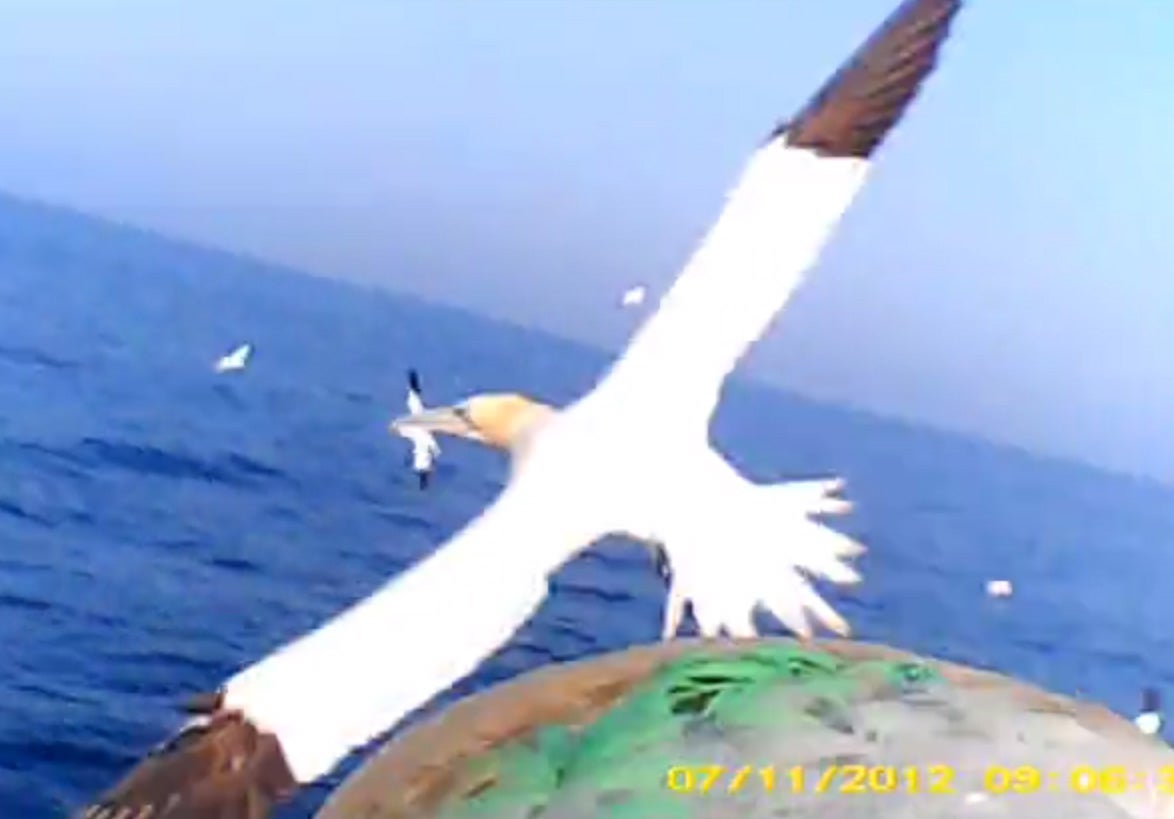'Gannet cam' video: Researchers capture stunning footage of UK's largest seabird
Cameras show bird passing ship, dramatic sea dive, skimming over waves and landing in colony

Miniature cameras attached to the bodies of the UK's largest seabird have captured stunning footage of them flying high above the Welsh coast.
See video player below
Researchers working at Pembrokeshire's RSPB Grassholm nature reserve attached the cameras to a number of nesting gannets, with the results showing a bird flying high above the coastline while ships pass below. The footage also shows the bird landing in the bustling colony, skimming low over the water and spectacularly plunging into the sea at speed during a feeding dive.
The film was taken by a team led by Steve Votier, from the University of Exeter, and Mark Bolton from the RSPB.
Dr Votier has been carrying out research on the gannets on the tiny island of Grassholm off the Pembrokeshire coast for the last eight years.
The island, just nine hectares in size, is home to the fourth largest northern gannet colony in the world - with just under 40,000 pairs breeding there.
Dr Votier said the footage was obtained using a state-of-the-art miniature camera developed by the RSPB conservation science team.
"Seabirds spend most of their time at sea away from their nesting sites, making them difficult to study," he said.
"This camera really helps shed light on their behaviour away from the colony. For example, it allows us to more accurately investigate their reliance on discards from trawlers and how they interact with other birds while far from land."
Dr Bolton, principal conservation scientist at the RSPB, helped develop the devices.
He said: "The lightweight camera works alongside a GPS unit that allows us to accurately track birds' flight patterns and measure how long they are flying, feeding or resting.
"This information can answer both scientific and conservation questions and could contribute to the designation of marine conservation zones in Wales."
This technique has already shed new light on ways that gannets make use of waste from fishing boats.

It was found that male gannets tended to feed more at trawlers than females and this difference may have conservation implications when a ban on discarding is implemented under reforms to the EU common fisheries policy.
Dr Votier believes that in the long term the work will be hugely beneficial.
"Gannets are long-lived seabirds and there is still much to learn about their life away from the breeding colony," he said.
"The application of technology to study the private lives of gannets has been influential to our research in the short term, but the goal is to continue this work in the long term to help provide a sustainable future for gannets and other marine life."
Ramsey Island and Grassholm site manager Greg Morgan said: "Dr Votier's research has contributed greatly to our knowledge of our Grassholm gannets over the years and this is hopefully the first step in the next exciting chapter."
Additional reporting PA
Join our commenting forum
Join thought-provoking conversations, follow other Independent readers and see their replies
Comments
Bookmark popover
Removed from bookmarks